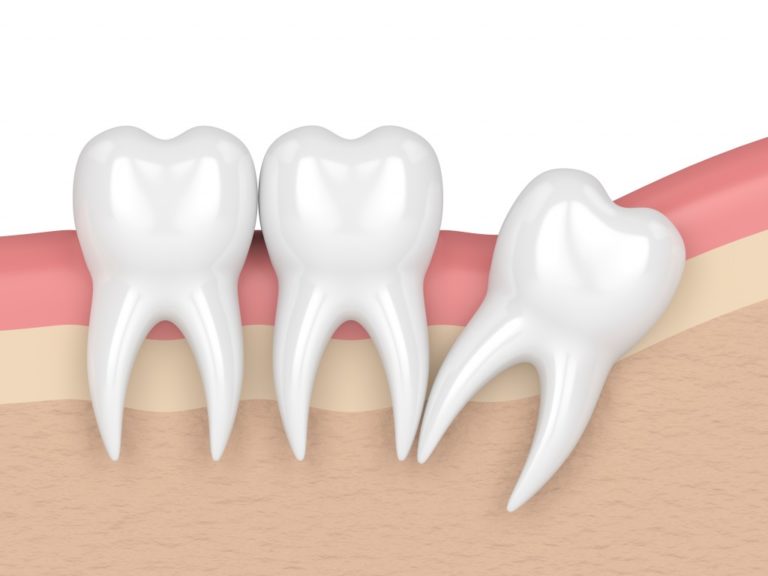Of all the teeth in a person’s lifetime, the wisdom tooth must be the most special. Either that or it’s the most misunderstood. First, it grows when a human being is already nearing adulthood, at 17 to 25 years old. It seems out of sync, doing too little too late. Plus, it forces its way to a complete set of teeth, oft-times causing tons of pain. Perhaps, calling it wisdom tooth is a bit of a misnomer. Not only do many people found its existence lacking purpose, but the pain that comes with its growth has also landed many in the hospital.
That’s why when your child is starting to show their wisdom teeth, you may have to prepare for the worst. Why? Because before the teeth erupt, your kid may experience extreme jaw pain and inflammation. Worse, it may cause health complications if you act too late.
Generally, wisdom teeth do not have any purpose at all. It’s just an extra pair of molars inside the mouth. It commonly grows sideways and crooked. As it gradually grows in, it may also cause problems like misalignment and overcrowding because these extra molars push other teeth.
But did you know those wisdom teeth are said to be of great help to our ancestors? That’s because their diets consist of many rough foods like reed plants and sticks. Consequently, their teeth usually fall out faster than they need them to. And wisdom teeth are the perfect replacement for those missing molars. It’s a knight in shining armor. However, with oral hygiene and our modern advancements, our teeth became stronger. In turn, these teeth replacements are usually not needed anymore. And there’s the rub. As wisdom teeth grow, your mouth could become overcrowded, causing you undue pain.
Luckily, there are telltale signs when these lower and upper third molars behind the mouth grow. Keeping a tab on them can go a long way in helping your child get over this challenge. Below are the essentials you need to get you started in the right direction.
Oral Pain
If your child is in a severe amount of pain, wisdom teeth might be one of the causes. Expect these uncomfortable extra molars to cause pain when they are forming in the gums. This is especially true when the wisdom tooth causes other permanent teeth to shift.
Moreover, if the teeth will rub against your teen’s cheek or tongue, pain follows. Or if their gums become infected, the pain will manifest itself.
Oral infection is most commonly caused by bacteria that are trapped within the gums. Not only will it cause oral pain, but it will also result in swelling, redness, and bad breath.
Even if the pain is still mild, you should still let your child see the dentist. This way, they can zero in on the issue at hand and come up with a precise diagnosis. That will help the dental professional to prescribe a proper treatment to ease oral pain.
Severe Pain Caused by Impacted Wisdom Tooth
For some, other teeth and the jaw bone can stop wisdom teeth from growing. In turn, the wisdom tooth might be trapped below the gum line. And this can amount to severe pain inside the mouth causing undue stress on the jaw. Mostly, the discomfort is not focused entirely on the extra molar. Instead, the pain will radiate from the jaw and drilling pain even up to the head.
Considering all this, you must tread with care. If your child is suffering from consistent headaches and jaw pain, an impacted wisdom tooth might be the cause. If you put this on hold, it may cause health complications. Worst-case scenario: The impacted wisdom tooth will develop into a cyst and form a tumor. In the long run, this will complicate the tooth extraction further.
In this regard, consulting a dental surgeon in the soonest possible time is wise. You should schedule a wisdom tooth extraction for your teen during their free day so you can come along. Rest assured that these experts will use safe and effective intravenous sedation during the operation. And with your support and cooperation, the recovery period of your child should be short.
Jaw Problems and Teeth Alignment

Sometimes, a wisdom tooth might cause teeth misalignment in your child and create jaw issues. If you don’t want a permanent misalignment of your child’s teeth and an underdeveloped jaw, you should seek advice for treatment immediately.
To solve this issue, consult an expert for the removal of the wisdom tooth. Not only does this help remove the pain and misalignment but it also protects your child’s oral health in the future.
A Smelly Breath
Some teens emit bad breath when they have wisdom teeth. But the causes may not be limited to the presence of wisdom teeth. Sometimes, it is because your child has bad dental hygiene, is taking medications, or has health problems.
For others, a smelly breath is a result of oral health problems. An example of this is wisdom tooth infection, chronic halitosis, and gum disease. To resolve this issue, consult with a dentist and seek the treatment of your child while it is still early.
The faster you can deal with the issue squarely, the better. Not only will it save you precious dollars, but it will also give your child the comfort that they deserve.

